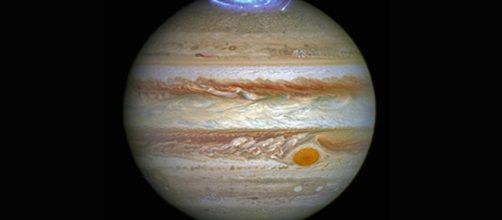The northern lights are one of the most stunning visual phenomenons on our planet, but this light show is not exclusive to our planet alone. Astronomers from NASA/ESA have used the ultraviolet abilities of the Hubble Space Telescope in order to capture the Auroras that regularly occur on the surface of Jupiter.
The lights and sounds of Jupiter
The Hubble Space telescope has provided astronomers and astrophysicists comprehensive visuals of the cosmos surrounding our planet, allowing them to better study and understand cosmic phenomenons. The latest visuals received by the telescope have recorded beautiful and vivid glows emitting from the poles of the monstrous planet.
These glows are known as Auroras and they occur when high energy particles collide with atoms of gas when entering the planet near its magnetic poles. These observations were also supported by accurate measurements provided by the Juno spacecraft which is currently heading towards Jupiter as well.
Fireworks in Space
Capturing this stunning display has greatly excited the scientific community which has always suspected the presence of these magnetic activities on other planets. The Principal investigator of this study - Jonathan Nicholas from the University of Leicester, UK, said "These auroras are very dramatic and among the most active I have ever seen. It almost seems as if Jupiter is throwing a firework party for the imminent arrival of Juno."
Scientists can now utilize the images provided by the Hubble to create a video that can clearly highlight the exact movement of the auroras on Jupiter.
They intend to observe the giant planet for nearly a month in order to record all the information necessary to create the video.
More power to Jupiter
Scientists have also noted that the auroras on the distant planet are hundreds of times more powerful than the ones created on our own planet. The northern lights on Earth are also seen intermittently, while those occurring on Jupiter are nearly permanent. If we ever manage to colonize other planets in the distant future, a spectacular and never ending light show in Jupiter is something we can all look forward to.

